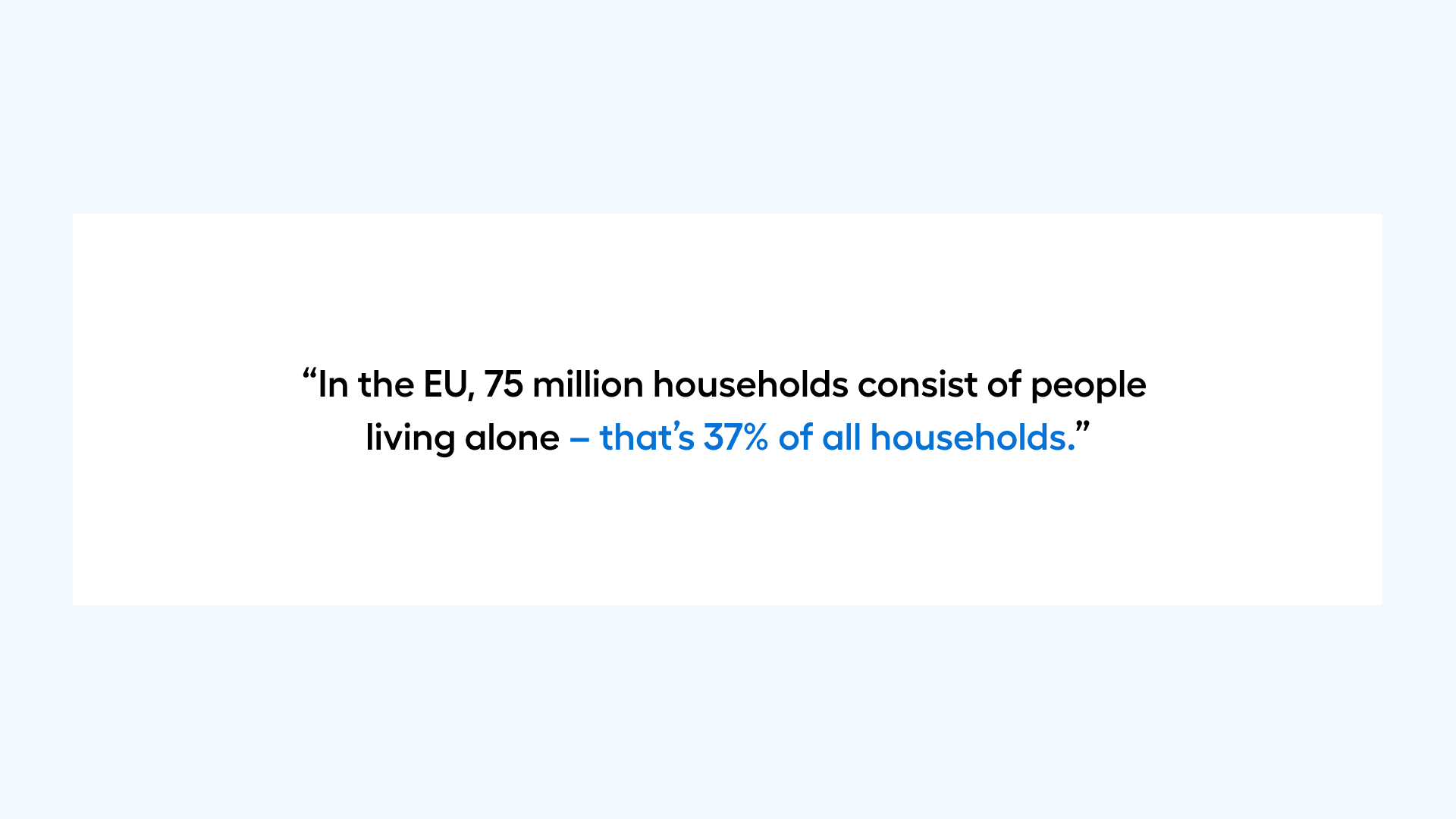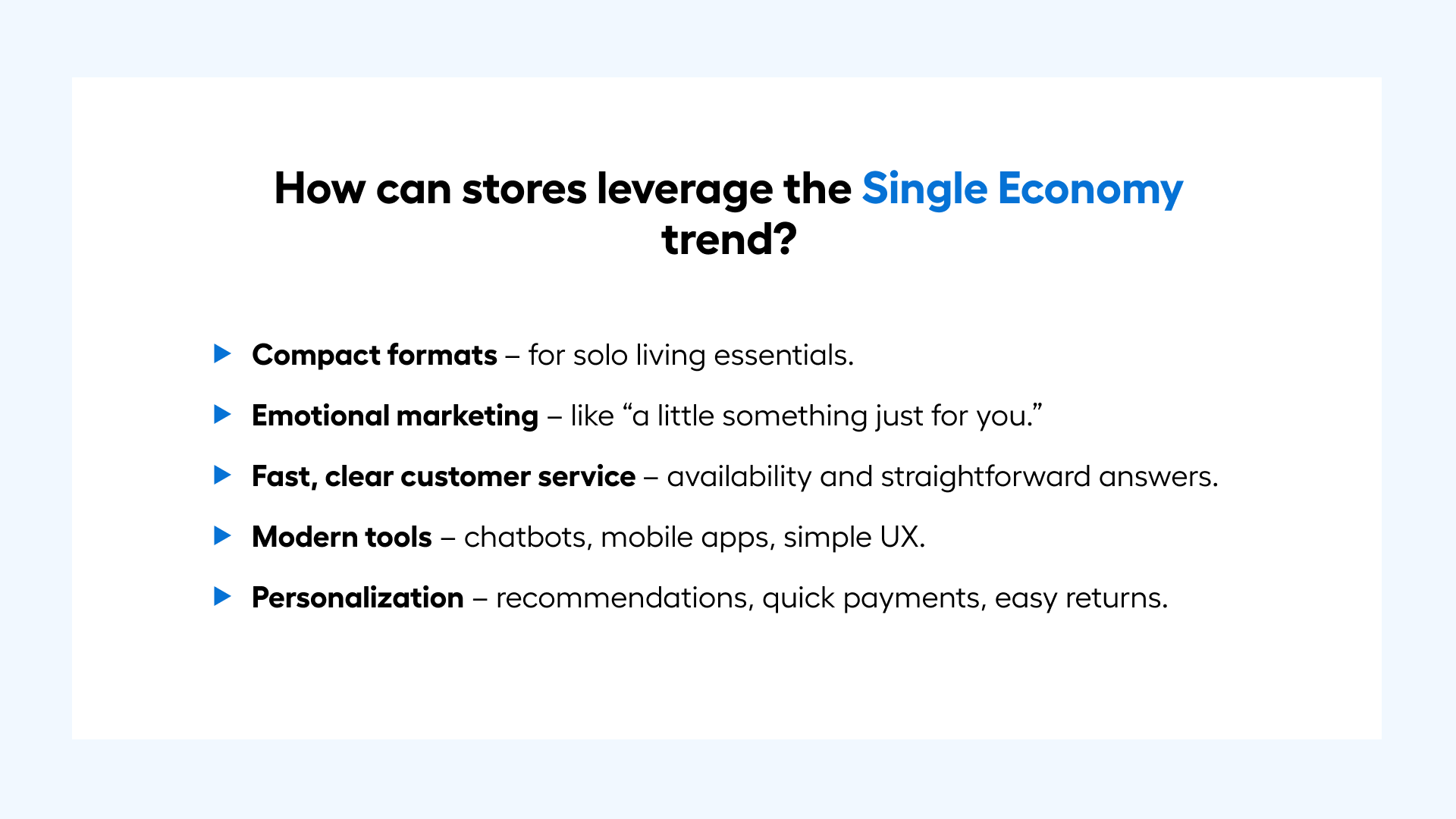The Single Economy Is Reshaping eCommerce – Can the Market Keep Up with Changing Consumer Expectations?
Table of Contents:
- Specific shopping habits of singles
- Trend towards self-care and premium products
- Analysis instead of impulsive purchases
- Convenient shopping and fast delivery
- How can stores leverage the Single Economy trend?
- Single Economy is an opportunity to build a market advantage
The Single Economy, or the economy of people living alone, is becoming an increasingly visible socio-economic phenomenon that significantly impacts the eCommerce market. Single individuals stand out with specific shopping needs: from more frequent but smaller orders, to growing expectations for product personalization, to convenient and flexible logistical solutions.
From a data perspective, the number of single-person households in the European Union is steadily increasing. According to the latest Eurostat statistics, in 2024 it reached 75 million, which corresponds to about 37 percent of all households (Eurostat 2024). This shows how significant a consumer group singles are becoming.
For the eCommerce industry, this is a clear signal. The ability to tailor offerings to the needs of this growing group can provide a significant competitive advantage. Single customers expect products tailored to individual needs, rapid delivery, and intuitive service. Companies that respond to these needs can not only increase their sales but, more importantly, build long-term customer loyalty.
 Source: Eurostat 2024
Source: Eurostat 2024
Specific shopping habits of singles
Singles exhibit distinctly different shopping habits compared to multi-person households. They shop more frequently but in smaller quantities. This model allows them to better manage daily needs, reduce food waste, and maintain product freshness. Large family-sized packages are not only impractical for this group but also uneconomical.
The growing interest in single-serving packaged products clearly confirms this trend. Singles are eager to choose smaller packages, especially for perishable items. This helps them minimize waste while better aligning their purchases with their lifestyle. This trend is not limited to food alone. It is equally strong in cosmetics, household chemicals, and hygiene products. Small packages enable singles to effectively manage their supplies and reduce unnecessary surpluses.
From a data perspective, the market for single-serving food products is developing dynamically. According to Grand View Research, this segment reached a value of approximately 4.37 billion dollars in 2024, with forecasts predicting growth to 6.53 billion dollars by 2030. This translates to an average annual growth rate of about 7 percent from 2025 to 2030. North America remains the largest market in terms of revenue, while the fastest growth is expected in China (Grand View Research).
The scale of the phenomenon becomes even more apparent when considering other industries. According to Global Market Insights, the global market for single-serving packaging for food, beverages, and other fast-moving consumer goods (FMCG) reached a value of 10.2 billion dollars in 2024. By 2034, its value could nearly double, reaching 19.8 billion dollars, which translates to a CAGR of about 6.8 percent (Global Market Insights). This shows how strong and enduring the trend of personalizing purchases towards smaller, practical formats is.
Trend towards self-care and premium products
Another clear phenomenon associated with the growing importance of the Single Economy is the intensification of the need for self-care, understood as consciously taking care of oneself and one's needs. People living alone often view shopping as a way to improve their mood or a form of reward for the effort put into work and daily responsibilities. As a result, there is greater interest in premium products that combine high quality with a sense of luxury.
This trend is particularly pronounced in categories such as cosmetics, consumer electronics, and branded clothing. Singles are more likely than other consumer groups to choose high-end skincare products, premium perfumes, and upscale fashion. For them, purchasing a product is often a conscious decision to invest in quality, aesthetics, and personal satisfaction.
Consumer electronics is another industry where this trend is clearly visible. Singles are eager to choose the latest smartphone models, high-performance laptops, or modern smart home solutions. These technologies not only make daily life easier but also serve as elements of style and self-expression.
From a lifestyle perspective, it is also worth noting that people living alone often take more care of their appearance. This is partly related to greater activity in the dating sphere, which naturally translates into the need to present themselves well and stand out through clothing or accessories. Premium fashion and accessories become tools for building an image and a way to express oneself in this context.
Analysis instead of impulsive purchases
A characteristic feature of singles as a consumer group is their thoughtful and responsible approach to budget management. Living alone and relying solely on one source of income, these individuals place great importance on rationalizing expenses. Before making a purchase, they carefully analyze available options, comparing not only prices but also product specifications, delivery conditions, and return policies.
Singles actively use price comparison tools that allow them to quickly compare offers from different sellers. User reviews are also very important to them. Reviews are treated as a reliable source of information about the quality, durability, and functionality of products. The decision-making process often takes longer than for other consumer groups and includes analyzing reviews on online forums, social media, and specialized industry portals.
Younger singles particularly follow recommendations from influencers, whom they see as sources of reliable and inspiring shopping information. The final decision usually favors the store that offers not only competitive prices but also transparent communication, high-quality customer service, and convenient return procedures.
For the eCommerce industry, this presents specific challenges. Stores must ensure precise and clear product descriptions, transparency in purchasing conditions, and continuously raise service standards. In return, they can count on the loyalty and trust of customers who know what they want and do not make hasty decisions.
Convenient shopping and fast delivery
One of the significant aspects that distinguishes singles as e-commerce customers is their clear expectation regarding convenience and speed of delivery. People living alone often lead busy lives, balancing professional obligations with social activities and hobbies. In this context, time gains particular value, and logistical solutions that allow for saving it become an important selection criterion for stores.
Singles appreciate flexible forms of package pickup. Parcel lockers, automated parcel machines, or local pickup points are very popular among this group. They allow for picking up purchases at any time, without having to wait for a courier at home. Such solutions perfectly meet the needs of singles who want to have full control over the time and place of order pickup.
The dynamic development of the quick commerce segment further strengthens this trend. Express deliveries of food, cosmetics, or everyday items, realized even within minutes of purchase, are meeting with growing interest. For singles, this is not only convenience but also real support in daily functioning. Immediate access to needed products is becoming a standard that they expect from modern online stores.
Companies that can respond to these needs and offer effective, flexible logistical solutions not only increase customer satisfaction but also build their loyalty. For singles, it matters not only the price but also the comfort and assurance that shopping will proceed smoothly and without complications.
How can stores leverage the Single Economy trend?
To effectively respond to the challenges and opportunities associated with the growing group of consumers living alone, online stores should primarily deeply understand their needs and decision-making processes. Special attention should be paid to tailoring the assortment to the scale of single-person households. Smaller portions of food products, cosmetics, or household chemicals become more practical and economical for singles, so they should be widely available in the offering.
Equally important is marketing communication that appeals to individual needs and emotions. Messages encouraging self-indulgence and emphasizing the personal nature of the purchase build a relationship with the customer, for whom shopping is not only a necessity but also a form of reward. In this context, slogans promoting self-care or product exclusivity may have a stronger impact than general sales messages.
Professional and accessible customer service is particularly important for singles. Individuals shopping alone expect clear information, quick responses to inquiries, and support at every stage of the purchasing process. It is worth investing in modern communication tools, such as chatbots or intuitive mobile applications, that enable efficient contact and quick problem resolution.
Loyalty programs and subscription models can also play an important role in building lasting relationships. Regular delivery of frequently purchased products allows singles to save time and avoid repetitive tasks, which in turn translates into convenience and greater satisfaction with the service.
Continuous monitoring of trends and flexible responses to changing shopping behaviors will also be crucial. Personalized recommendations based on purchase history, automatic ordering features, quick and hassle-free payment and return methods, detailed product descriptions with practical usage tips, a mobile and simple store interface, express delivery with tracking options, and offers specifically targeted at singles are concrete solutions that can determine competitive advantage.
Through such actions, stores will not only increase their effectiveness in acquiring customers from the Single Economy segment but also build loyalty based on understanding and real value delivered to consumers.

Single Economy is an opportunity to build a market advantage
The Single Economy is a growing trend that redefines consumer needs and forces changes in e-commerce. People living alone more often shop in smaller quantities, choose premium products, and expect convenient shopping solutions. They are characterized by high consumer awareness, a long decision-making process, and a strong need for personalization. Stores that respond to these needs by adapting their offerings, providing flexible logistics, professional service, and accurate communication have the chance not only to attract this demanding group of customers but also to build lasting relationships with them.



